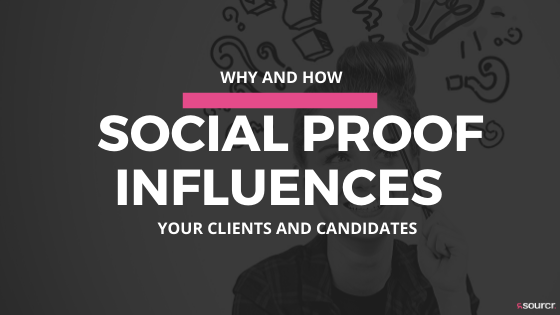What is Social Proof?
Social proof is the trust you build through your reviews, social likes, online mentions and testimonials of your service. It has a powerful psychological effect on your clients and candidates. Because the feedback comes from your previous clients and candidates – the positive messaging surrounds your service and experience.
Your future clients and candidates will see social proof as an endorsement from their peers saying that the agency and consultant are approved of and the overall candidate experience and clients journey was impressive.
Don’t take our word for it. A recent study by Trustpilot discovered:
- An average of 66% of prospects said the presence of social proof increased their likelihood of choosing a service
- Positive star ratings and reviews were the most important trust symbol. 82% said it would make them likely to purchase
- Positive star ratings and reviews on your website or account will drive 86% of prospects to choose you
Want to learn more? Let’s dive deeper into research to see which trust signal is most important and what purpose they serve.
Different Types Of Social Proof In Recruitment Industry
- Positive Star Ratings
- Positive Reviews
- Positive Candidate & Client Testimonials
- Industry recognised badges such as being part of RCSA
- Case Studies
- Company’s Logo and Brand Colours
- Public Figure Endorsements
- Through Leaders Endorsements
- Company’s Social Media Metrics
As you can see, there are many ways to social proof yourself. Some trust signals might mean more than others. Some prospects might be swayed by your positive reviews while some are by your social media metrics. It’s important to build all different types of trust signals and social proof yourself in the digital age.
Tailoring Your Trust Signals To Your Target Market
It’s important to understand who your customers are so you can identify and share the trust signals that matter the most.
Gen Z are more likely to be influenced by social media metrics than a case study, while baby boomers will be more influenced by reviews and case studies and testimonials than social media. That is why it’s important to know who you are targeting and choose the right channel for them.
Do you need a candidate pool of young professionals? Look towards targeting them through social media. Are you social proofing yourself for your future clients? Look to build a portfolio of reviews from other employers that you have worked with.
Depending on who you need – target your audience that way.
How Trust Signals Work
Unaffected by ads in this digital age; it’s now harder to inform customers, build trust, and engage your prospects.
Gone are the days where customers used to rely on advertisements and word of mouth when choosing a service. Now, they look for social proof.
Social proof helps in these 4 areas:
1) UNCERTAINTY: The prospect looks for guidance when they are in an unfamiliar situation (e.g. a recent graduate student is looking for a recruiter to land their first full-time job. However they don’t know where to start or who to choose.)
2) SIMILARITY: They gather and use feedback from sources and people they personally relate to (e.g. the same student reads a review from another recent graduate and how a specific recruiter helped them find a job. They now know who to look into or what to look for)
3) EXPERTISE: The prospect values opinions and verification from people who are more knowledgeable/experienced than themselves (e.g. the student reads more reviews followed by that one from more experienced professionals about what it was like working with this specific recruiter, they are now starting to believe it.
4) NUMBERS: They consider the number of satisfied customers before them and the resulting trust signals (e.g. if they see that you have a higher rating from 132 reviews while another recruiter only has 32 reviews – they are more likely to trust you.)
Today, social proof is more influential than ever. Your prospects need help and guidance to trust you, social proof offers authentic transparent guidance that they want and crave.
Where To Use Trust Signals
No matter the industry, all marketing efforts seem to work better when they feature trust signals. However, it’s important to know that they can work differently in different places.
For e.g. public figure/thought leaders endorsements are good to raise awareness of your brand. While testimonials and star ratings are good when prospects are trying to choose between two recruiters or two agencies.
Therefore, for trust signals to work effectively it needs to be delivered to the right audience at the right time and through the right means.
You can include trust signals in Emails, Facebook Ads, your website, LinkedIn etc
Trust Signals are very important and you could assume it requires a lot of work and effort.
But that is not true. To make it less time consuming, easy to use and get more without paying more, we introduced Sourcr – an all in one reputation management platform. It takes less than 30 seconds to start social proofing yourself in today’s market.
RECOMMENDED READING If you enjoyed reading this article about social proof, why not dive deeper into it? - How Do Recruiters Benefit From Online Reviews? - The Best Way For Recruiters To Gain Credibility in 2020 - 6 Innovative Ways You Can Use Your Sourcr Profile - The Ultimate Review Collection Strategy For Recruiters






